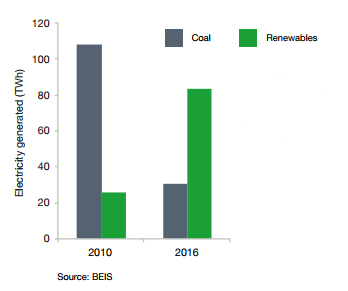Ten years ago this week, a group of Greenpeace volunteers snuck into Kingsnorth coal power station just before daybreak.
Emily, Huw, Kevin, Tim, Will and Ben climbed the plant’s 200m chimney, forcing the plant to go offline. Standing at the top, those activists looked out over a different world.
- Polluting coal plants like Kingsnorth supplied a third of the UK’s electricity, and the government was considering plans to build new ones across the country.
- Renewables were basically non-existent, supplying less than 6% of our electricity.
- Most people had never seen an electric vehicle. They were seen as a niche technology for eccentrics and enthusiasts.
- Much of the rest of the world was on a coal-building boom. The ‘China builds a coal power station a week’ talking point was common currency in the climate debate.
The Kingsnorth activists knew that we shouldn’t be building new coal power stations in an age of climate change. And for this, many dismissed them as radical and unrealistic. But their action – and the groundbreaking court case that followed – helped to transform the debate.
Kingsnorth’s legacy
Fast forward 10 years, and we can finally see how things played out. Kingsnorth was shut down in 2013, and plans for its replacement were shelved years ago. The giant chimney – which once put out as much pollution as 30 entire countries combined – will be demolished later this year.
If those activists climbed up for one last look, they’d see a country where coal and renewables had basically swapped places.

- They’d see renewable energy cheaper than anyone imagined. Even once-expensive offshore wind power now undercuts nuclear and competes on price with gas. Meanwhile, 2017 saw the first coal-free day since the Industrial Revolution.
- They’d see electric buses, vans and cars on the roads, with new, cheaper models getting 300 miles per charge.
- And if they’d packed some really strong binoculars, they’d see 26 countries including Canada, the Netherlands and even China closing coal plants.
And they’d see a Conservative government that’s just released a plan for cutting emissions even further. It needs more detail and ambition in quite a few places, no doubt. But it’s full of enthusiasm for a clean economy that wouldn’t be out of place in a Greenpeace press release.
Climate Change Minister Claire Perry explains how the UK is leading the way to a low carbon future. #CleanGrowth https://t.co/mBKf5itLTj pic.twitter.com/tcn8JxcHiR
— Dept for BEIS (@beisgovuk) October 12, 2017
Protests and direct action are sometimes denounced as childish, but as one commentator put it today – the grown-ups have won.
10 years after Kingsnorth, the climate movement is bigger and more crucial than ever. Of course, we’re still a long way from where we need to be. But sometimes it’s worth finding a good vantage point and seeing how much the landscape has changed.



